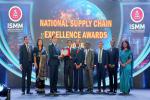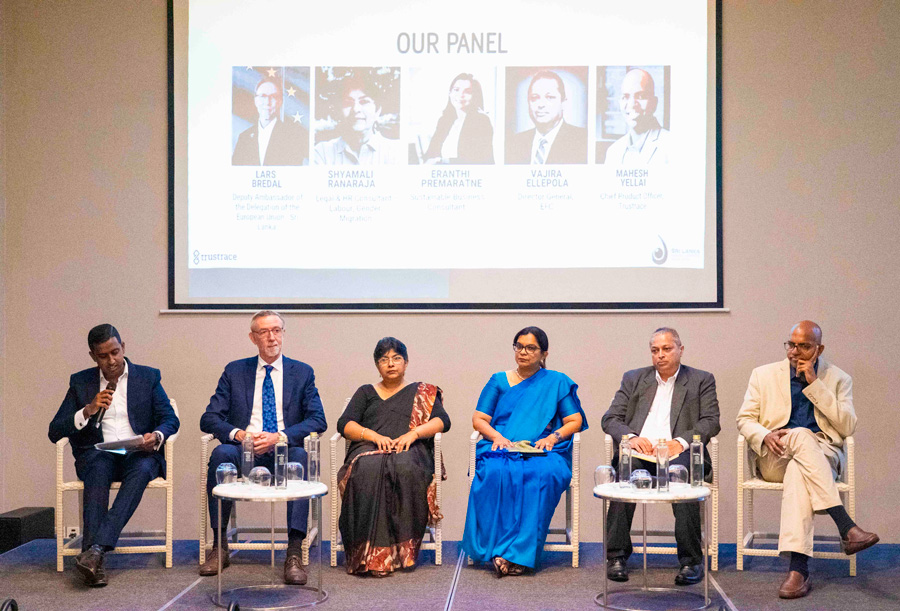Designed to strengthen awareness and preparedness, the session focused on the far-reaching implications of the directive for Sri Lanka’s export economy — particularly in key sectors such as apparel, tea, and rubber.
The forum attracted participation from apparel manufacturers, consultants, legal experts, public sector representatives, and exporters across multiple industries like tea and rubber.
It featured keynote insights from Lars Bredal, Deputy Ambassador of the Delegation of the European Union to Sri Lanka, and governance specialist Shyamali Ranaraja, alongside a panel of sector leaders including Vajira Ellepola (Director General - EFC), Eranthi Premaratne (Consultant – Sustainable Business), Mahesh Yellai (Chief Product Officer - TrusTrace), and moderator Navindu Munidasa (Manager Supply chain and strategy Development - MAS Holdings).
Opening the session, SLAEA Chairperson Rajitha Jayasuriya welcomed participants and outlined the importance of the discussion.
“This session was initiated by the apparel industry, but its intent extends far beyond the apparel sector,” she stated.
“The CSDDD represents more than a regulatory shift.
It marks a new chapter in how international trade will be shaped and governed.”
She highlighted the far-reaching implications of the directive for an export-driven economy like Sri Lanka.
“It places responsibility and legal obligation not only on large EU companies, but by extension on every partner along the value chain—be it manufacturers, suppliers, raw material providers, or other supporting services—to proactively identify, prevent, and address human rights and environmental risks within their operations.”
Jayasuriya also emphasised the broader context in which this regulation must be understood.
“Beyond its technical requirements, it is also important to view the CSDDD within Sri Lanka’s economic context.
Our continued access to the GSP Plus scheme depends on our country’s demonstrated commitment to human rights, environmental standards, and good governance.”
While acknowledging Sri Lanka’s globally recognised ethical manufacturing practices, particularly in apparel, she noted that individual excellence is no longer enough.
“Sri Lanka has long been recognised for its ethical practices, particularly in the apparel sector.
But now, we must move from singular to collective excellence as a nation.
Systemic readiness is where every player in the value chain understands their responsibility and is prepared to follow through with practical action.”
EU Deputy Ambassador Lars Bredal reaffirmed the EU’s support for responsible and sustainable trade practices, noting that CSDDD compliance should be seen not just as a regulatory hurdle but a strategic advantage.
“Ethical business is good business,” he remarked.
“Those who prepare early will be better positioned to attract investment and forge lasting partnerships with European buyers.”
Bredal also confirmed that the implementation timeline for the CSDDD has been extended to 2028, giving companies additional time to build capacity.
He referenced related EU policies, such as the deforestation regulation, that will impact other Sri Lankan exports like rubber and timber.
Praising the quality of the SLAEA event, he described it as “one of the most professional and well-prepared” sessions he had attended on the directive.
Keynote speaker Shyamali Ranaraja offered valuable legal and strategic insight, tracing how due diligence has shifted from a voluntary CSR initiative to a binding legal obligation.
She stressed that even suppliers outside the EU — including those in Sri Lanka — are expected to comply due to cascading requirements from European buyers.
From outsourced logistics to staff canteens, no part of the supply chain is exempt, she warned.
“This isn’t a philosophical debate. This is about staying in business.”
A dynamic panel discussion explored the operational realities of implementation, touching on topics such as digital traceability tools, governance frameworks, and buyer expectations.
Across the board, panellists agreed that while the transition may be complex, it represents a major opportunity for Sri Lanka to reinforce its global credibility and strengthen long-term buyer trust.
Concluding the session, Jayasuriya remarked,
“Our ability to meet the demands of this new global trade landscape will determine not just the future of our apparel sector, but the future of Sri Lanka’s export economy.
Today was a meaningful step in that direction.”






















